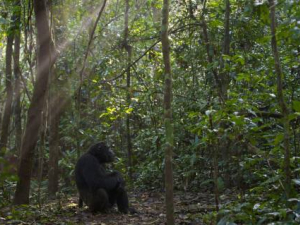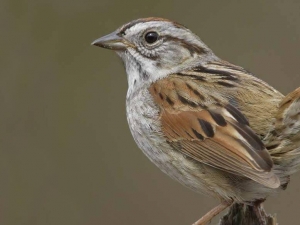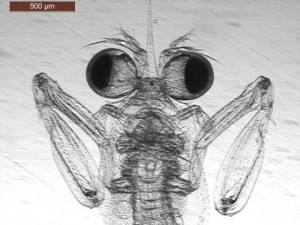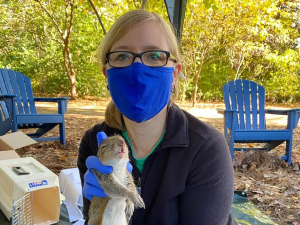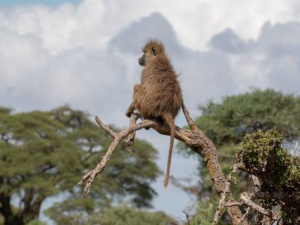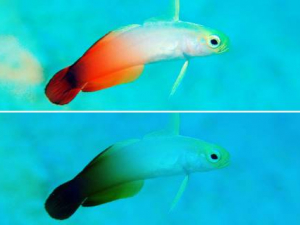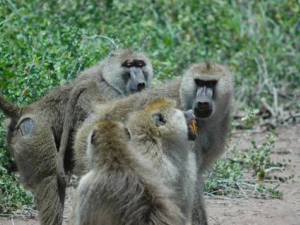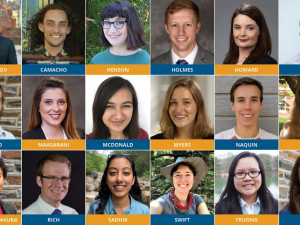Record high temperatures, water shortages, prolonged droughts, soil salinification. Things aren’t exactly looking up for fruit and produce growers. Lucia Strader, an associate professor in Biology, has just been awarded a $3.36 million grant from the National Sciences Foundation (NSF) to try to help. Along with Drs. Ross Sozzani, from North Carolina State University, and Max Staller, from the University of California, Berkeley, Strader is proposing a new method that would allow scientists to improve plants’ resistance to… read more about Biology Professor Lucia Strader Awarded $3.4 Million to Revolutionize Transgenic Plants »
Duke University has awarded distinguished professorships to 22 faculty members representing seven Duke colleges and schools. “Our honorees are recognized as international leaders in a diverse range of fields,” said President Vincent Price. “Their research has already had a significant impact on broader society, helping to improve lives and shape our understanding of the world.” The honorees are the “successors of faculty leaders who helped define the university’s commitment to ethical scholarship, leadership… read more about Duke Awards 22 Distinguished Professorships »
Richard Hilleary, a postdoc in Sheng Yang He’s lab, was awarded a two-year fellowship to identify and leverage molecular mechanisms that render some plants more resilient to increases in temperature. The NIFA fellowship is part of the United States Department of Agriculture (USDA)’s Agriculture and Food Research Initiative program (AFRI). This Initiative aims at funding the next generation of researchers, education, and extension professionals in the food and agricultural sciences. The postdoctoral fellowships in… read more about Postdoc Richard Hilleary receives NIFA fellowship from the USDA »
When he was an undergraduate political science student, Kerry Haynie was never taught about the 1921 Tulsa massacre. Nor was there much discussion about the role of race in the founding political documents of this country or much examination of how race influenced public services such as sewer lines and zoning. In one sense, a lot has changed. In 2021, Duke’s faculty includes a strong lineup of leading scholars who examine how race is embedded in issues that cross all the schools of the university. This fall, many of… read more about University Course Raises Race as a Central Element of Undergraduate Education »
DURHAM, N.C. – Special diets, exercise programs, supplements and vitamins -- everywhere we look there is something supposed to help us live longer. Maybe those work: human average life expectancy has gone from a meager 40-ish years to a whopping 70-something since 1850. Does this mean we are slowing down death? A new study comparing data from nine human populations and 30 populations of non-human primates says that we are probably not cheating the reaper. The researchers say the increase in human life expectancy is more… read more about Sweeping Analysis Concludes There’s No Cheating Old Age »
Biology. A discipline full of wonder, discovery, fancy equipment, gorgeous field sites, charismatic organisms, and jargon. Lots of jargon. So much jargon that it is sometimes hard to decipher who studies what. Enter BioGist, Duke Biology’s new podcast, which gives you just the gist of what our amazing faculty study, how they study it, and why. It also gives you a little glimpse of how cool they are when they are not hard at work (yes, faculty have real lives outside of work). BioGist is made by undergrads for undergrads… read more about BioGist, our new Podcast! »
A new Trinity College of Arts & Sciences program offering peer mentoring to Ph.D. students in their first, second or third year at Duke will begin hosting meetings this fall, and has selected the inaugural class of fellows to lead those groups. Designed as small, interdisciplinary mentoring groups each facilitated by a peer fellow, the program aims to help students flourish in their respective doctoral programs – providing a confidential space to navigate frustrations, offering a diversity of perspectives, encouraging… read more about Trinity Launches Peer Mentoring Program for Early-Stage PhD Students »
by Frank Graff - PBS North Carolina What do choirs, orchestras, bands, dancers, and athletes all have in common? If you answered they are all performers in their respective fields, you’d be correct. And what do performers do before they go on stage or take the field? They warm up, to help ensure that when it’s their time to shine, they perform at their best. Duke University researchers have discovered that birds do the same thing in the early morning, just as the sun is shining. By… read more about Why Birds Sing Loudly in the Morning »
DURHAM, N.C. -- With mosquito season upon us, people are stocking up on repellents to prevent itchy bites. Bug repellents are important because they don’t just protect against the buzzing, blood-sucking little pests -- they also safeguard against the diseases they carry, which kill some 700,000 people worldwide each year. Surprisingly, despite widespread use, no one understood exactly how most mosquito repellents keep the insects away. Now researchers are starting to uncover the first pieces of the puzzle. A new study has… read more about How One of the Oldest Natural Insecticides Keeps Mosquitoes Away »
DURHAM, N.C. – Mantis shrimp don’t need baby food. They start their life as ferocious predators who know how to throw a lethal punch. A new study appearing April 29 in the Journal of Experimental Biology shows that larvae of the Philippine mantis shrimp (Gonodactylaceus falcatus) already display the ultra-fast movements for which these animals are known, even when they are smaller than a short grain of rice. Their ultra-fast punching appendages measure less than 1 mm, and develop right when the larva exhausts its yolk… read more about Baby Mantis Shrimp Don’t Pull Their Punches »
In a challenging year for collaboration, three members of the Class of 2022 are being honored for using the moment to ask big research questions and produce scholarship that shows originality and creative thinking. Katherine Gan, Logan Glasstetter and Xinyu (Norah) Tan are the recipients of this year’s Faculty Scholars Awards, the highest bestowed by Duke faculty on undergraduates with a record of independent research and scholarship. Working across three different disciplines, the students have already produced… read more about The 2021 Faculty Scholars: Three Undergraduates Showing an Exceptional Research Record »
Six members of the Class of 2022 have been named to the inaugural class of Nakayama Scholars. Juniors Sydney Albert, Carlee Goldberg, Erica Langan, Yi Xian “Lyndon” Lee, Ahn-Huy Nguyen, and Micalyn Struble were chosen for their stellar academics, leadership and demonstrated commitment to a career in public service. The Nakayama Public Service Scholarship is part of the university’s efforts to encourage students to use their Duke experience to engage with the large challenges facing communities around the world. The… read more about Six Students Named Inaugural Nakayama Public Service Scholars »
DURHAM, N.C. -- Female baboons may not have bills to pay or deadlines to meet, but their lives are extremely challenging. They face food and water scarcity and must be constantly attuned to predators, illnesses and parasites, all while raising infants and maintaining their social status. A new study appearing April 21 in Science Advances shows that female baboons with high life-long levels of glucocorticoids, the hormones involved in the ‘fight or flight’ response, have a greater risk of dying than those with lower levels… read more about Stress and Death in Female Baboons -- as Measured by Hormones in Poop »
DURHAM, N.C. -- When marine biologist Eleanor Caves of the University of Exeter thinks back to her first scuba dives, one of the first things she recalls noticing is that colors seem off underwater. The vivid reds, oranges, purples and yellows she was used to seeing in the sunlit waters near the surface look increasingly dim and drab with depth, and before long the whole ocean loses most of its rainbow leaving nothing but shades of blue. “The thing that always got me about diving was what happens to people's faces and lips… read more about Warming Seas Might Also Look Less Colorful to Some Fish. Here’s Why it Matters. »
DURHAM, N.C. -- Some guys have it all: the muscle, the power, the high social status, the accelerated aging. But wait. Faster aging? Who wants that? For male baboons, it’s the price they pay to be at the top. New research appearing April 6 in eLife by Jenny Tung, associate professor of evolutionary anthropology and biology at Duke University, and her colleagues shows that male baboons that climb the social ladder age faster than males with lower social standing. If a male drops in social status, his estimated rate of… read more about A Male Baboon’s Dominance Gives Him Babies, but Costs Him Years »
DURHAM, N.C. -- Emily Ury remembers the first time she saw them. She was heading east from Columbia, North Carolina, on the flat, low-lying stretch of U.S. Highway 64 toward the Outer Banks. Sticking out of the marsh on one side of the road were not one but hundreds dead trees and stumps, the relic of a once-healthy forest that had been overrun by the inland creep of seawater. “I was like, ‘Whoa.’ No leaves; no branches. The trees were literally just trunks. As far as the eye could see,” said Ury, who recently earned a… read more about Mapping North Carolina’s Ghost Forests From 430 Miles Up »
In a new paper in Advanced Genetics, Dr. Charmaine Royal and colleagues say an array of factors — including environmental and social conditions — shape the course of illness. read more about Sickle Cell Disease: More Than A Genetic Condition »
You can blame the Boy Scouts for Dr. William Morris’ career. That wouldn’t be such an unusual origin story for an ecologist. What is unusual are the lengths to which Morris takes his passion for the great outdoors. Studying nature wasn’t enough: he wanted to study nature in extreme environments. Morris’ research focuses on understanding how plants and the insects that eat and pollinate them respond to climate change. His work takes him to some of the most severe environments on Earth, including the 10,000-foot peaks of… read more about Professor Bill Morris Named a Fellow of the Ecological Society of America »
This year, 18 Duke Ph.D. students were selected as part of the NSF Graduate Research Fellowship Program (GRFP). This competitive fellowship provides students with a stipend, money for their research, and covers their tuition. It is considered the most prestigious fellowship a young researcher may receive in the United States. Katie Henson will use her fellowship to explore the secret language of zebra finches. More specifically, she will look at the role of black and white striped feather patterns (also… read more about Ph.D. Student Katie Henson selected for NSF's Graduate Research Fellowships Program (GRFP) »







